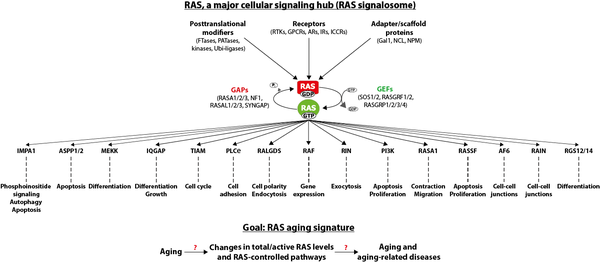Former Fellow Group - Cirstea (until 2017)
Former FLI Fellow Dr. Ion Cirstea moved to the of the Ulm University continueing his work on aging-related and hormone-dependent changes of the expression and activation of RAS GTPases and its downstream pathways.
Cellular Signaling Pathways:
Small Molecular Control Switches
The RAS superfamily of small GTPases act as molecular switches in several signaling pathways, cycling between an active GTP-bound, and an inactive GDP-bound form. In its GTP-bound form, RAS interacts with and regulates a vast spectrum of functionally diverse downstream effectors, controlling many biological processes such as proliferation, differentiation, apoptosis, and migration.
Somatic mutations in the HRAS gene (codons 12, 13 and 61) lead to cancer, whereas germline mutations (most frequent at codon 12) lead to the Costello Syndrome (CS), a rare human disease. RAS mutations at codon 12 lead to a constitutive active RAS protein and the subsequent hyper-activation of downstream signaling pathways. CS patients live to adulthood and exhibit papillomata, baldness, hypertrophic cardiomyopathy, reduced muscle tone, osteoporosis, postural deficit, and a striking premature-aged appearance. Although the mutations affect the same residues as RAS oncogenic mutations, CS patients only occasionally develop cancer and at a lower age when compared to the general population.
Combining these observations, we hypothesize that HRAS hyper activation in CS through unknown mechanisms leads to a premature aging program, as well as to a resistance to oncogenic transformation.
Using protein biochemistry, cell biology and mouse models, we investigate the mechanistic link between aging and cancer and try to understand the RAS expression patterns, as well as its activation and identification of RAS-regulated pathways triggered during organismal aging (“RAS aging signature”). Ultimately, we strive to identify inhibitory molecules and create new therapies to repel developmental disorders and the improvement of life quality during human aging.










